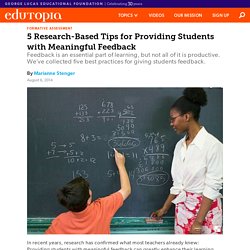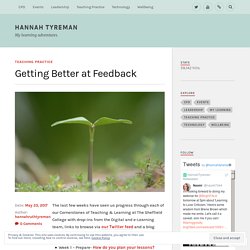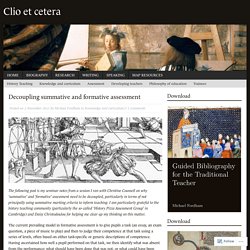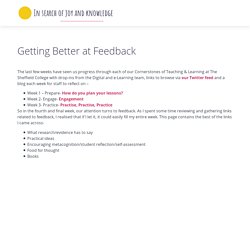

Instructional Coaching. Modelling. READING - The Power of Feedback- John Hattie. 5 Research-Based Tips for Providing Students with Meaningful Feedback. In recent years, research has confirmed what most teachers already knew: Providing students with meaningful feedback can greatly enhance their learning and achievement.

Professor James Pennebaker from the University of Texas at Austin has been researching the benefits of frequent testing and the feedback it leads to. He explains that in the history of the study of learning, the role of feedback has always been central: “When people are trying to learn new skills, they must get some information that tells them whether or not they are doing the right thing. Learning in the classroom is no exception. Both the mastery of content and, more importantly, the mastery of how to think require trial-and-error learning.” The downside, of course, is that not all feedback is equally effective, and it can even be counterproductive, especially if it’s presented in a solely negative or corrective way.
So what exactly are the most effective ways to use feedback in educational settings? 1. 2. 3. 4. 5. 5 key strategies for effective formative assessment. VIDEO - John Hattie and Helen Timperley on Feedback. Dr Dylan Wiliam The Secret of Effective Feedback. Getting Better at Feedback. The last few weeks have seen us progress through each of our Cornerstones of Teaching & Learning at The Sheffield College with drop-ins from the Digital and e-Learning team, links to browse via our Twitter feed and a blog each week for staff to reflect on – So in the fourth and final week, our attention turns to feedback.

As I spent some time reviewing and gathering links related to feedback, I realised that if I let it, it could easily fill my entire week. This page contains the best of the links I came across- What research/evidence has to sayPractical ideasEncouraging metacognition/student reflection/self-assessmentFood for thoughtBooks If you think I’ve missed any essentials then please comment below or share your links on Twitter @hannahtyreman It would seem that feedback preoccupies the mind of many an educator, leader and researcher.
If that’s what you’ve chosen to read this blog for, that silver bullet, then let me disappoint you now before you get much further. Growth Mindset. Research Conference Handout.pptx. Decoupling summative and formative assessment. The following post is my seminar notes from a session I ran with Christine Counsell on why ‘summative’ and ‘formative’ assessment need to be decoupled, particularly in terms of not principally using summative marking criteria to inform teaching.

I am particularly grateful to the history teaching community (particularly the so-called ‘History Pizza Assessment Group’ in Cambridge) and Daisy Christodoulou for helping me clear up my thinking on this matter. The current prevailing model in formative assessment is to give pupils a task (an essay, an exam question, a piece of music to play) and then to judge their competence at that task using a series of levels, often based on either task-specific or generic descriptions of competence. Having ascertained how well a pupil performed on that task, we then identify what was absent from the performance: what should have been done that was not, or what could have been done better? And, in some ways, this is fine. But herein lies the problem. Feedback for Learning:Seven Keys to Effective Feedback. t11_providingpres.
Questions and Answers About Formative Assessment. The Secret of Effective Feedback. What can we learn from Dylan Wiliam and AfL? ‘The only thing we learn from the past is how little we’ve learned from our mistakes’.

Geog Wilhem Friedrich Hegel ‘Those who cannot remember the past are condemned to repeat it’ George Santayana ‘Blessed are the forgetful: for they get the better even of their blunders’. Friedrich Nietzsche Inside the black box of classroom practice… Formative assessment helps pupils understand how to improve but requires teachers to focus on what works best and change their habits of practice. i. Before I started to teach, my Head of Department said, ‘if you read one thing, read ‘Inside the Black Box’. AfL in a nutshell. ii. Few education concepts have been more distorted in a shorter time span than formative assessment: teachers falling prey to gimmicks, schools mandating unhelpful AfL policies, and government policy confusing AfL with national levels. Dylan Wiliam himself recognises these unintended consequences as what he calls ‘policy diffraction;’ or, more graphically, ‘scoring a spectacular own goal’. Getting Better at Feedback – In search of joy and knowledge.
Getting Better at Feedback The last few weeks have seen us progress through each of our Cornerstones of Teaching & Learning at The Sheffield College with drop-ins from the Digital and e-Learning team, links to browse via our Twitter feed and a blog each week for staff to reflect on – So in the fourth and final week, our attention turns to feedback.

As I spent some time reviewing and gathering links related to feedback, I realised that if I let it, it could easily fill my entire week. This page contains the best of the links I came across- What research/evidence has to sayPractical ideasEncouraging metacognition/student reflection/self-assessmentFood for thoughtBooks If you think I’ve missed any essentials then please comment below or share your links on Twitter @hannahtyreman It would seem that feedback preoccupies the mind of many an educator, leader and researcher. I’m aware that there will be a variety of educators reading this blog – from schools, colleges and other settings too. Menu.